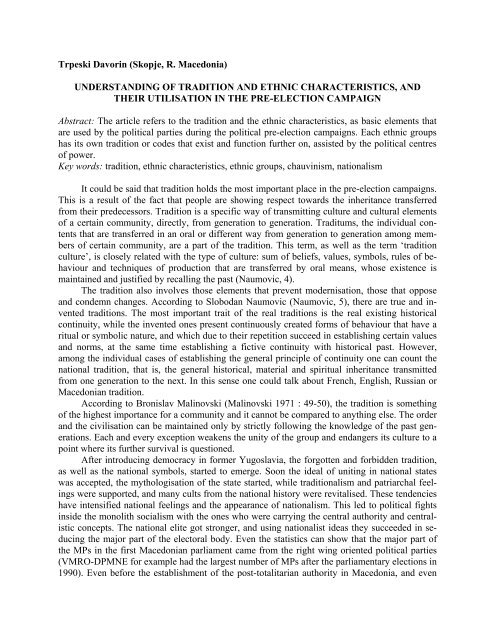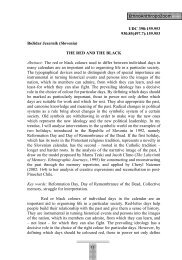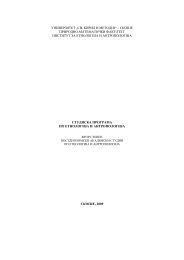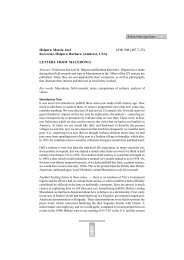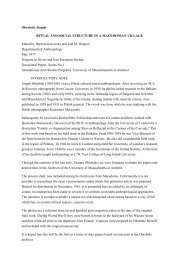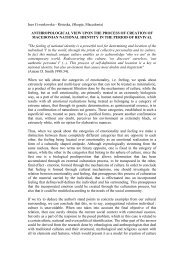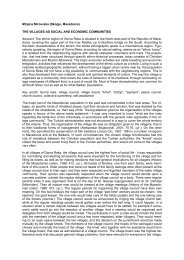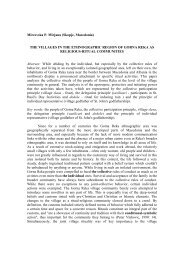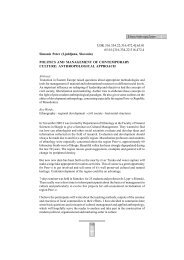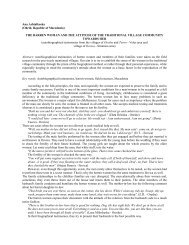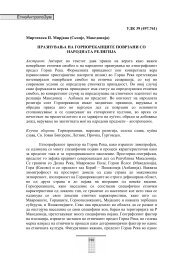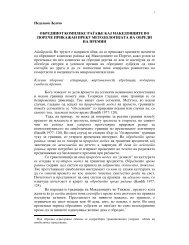Davorin Trpeski (Skopje, Macedonia) Understanding Of Tradition ...
Davorin Trpeski (Skopje, Macedonia) Understanding Of Tradition ...
Davorin Trpeski (Skopje, Macedonia) Understanding Of Tradition ...
Create successful ePaper yourself
Turn your PDF publications into a flip-book with our unique Google optimized e-Paper software.
<strong>Trpeski</strong> <strong>Davorin</strong> (<strong>Skopje</strong>, R. <strong>Macedonia</strong>)<br />
UNDERSTANDING OF TRADITION AND ETHNIC CHARACTERISTICS, AND<br />
THEIR UTILISATION IN THE PRE-ELECTION CAMPAIGN<br />
Abstract: The article refers to the tradition and the ethnic characteristics, as basic elements that<br />
are used by the political parties during the political pre-election campaigns. Each ethnic groups<br />
has its own tradition or codes that exist and function further on, assisted by the political centres<br />
of power.<br />
Key words: tradition, ethnic characteristics, ethnic groups, chauvinism, nationalism<br />
It could be said that tradition holds the most important place in the pre-election campaigns.<br />
This is a result of the fact that people are showing respect towards the inheritance transferred<br />
from their predecessors. <strong>Tradition</strong> is a specific way of transmitting culture and cultural elements<br />
of a certain community, directly, from generation to generation. Traditums, the individual contents<br />
that are transferred in an oral or different way from generation to generation among members<br />
of certain community, are a part of the tradition. This term, as well as the term ‘tradition<br />
culture’, is closely related with the type of culture: sum of beliefs, values, symbols, rules of behaviour<br />
and techniques of production that are transferred by oral means, whose existence is<br />
maintained and justified by recalling the past (Naumovic, 4).<br />
The tradition also involves those elements that prevent modernisation, those that oppose<br />
and condemn changes. According to Slobodan Naumovic (Naumovic, 5), there are true and invented<br />
traditions. The most important trait of the real traditions is the real existing historical<br />
continuity, while the invented ones present continuously created forms of behaviour that have a<br />
ritual or symbolic nature, and which due to their repetition succeed in establishing certain values<br />
and norms, at the same time establishing a fictive continuity with historical past. However,<br />
among the individual cases of establishing the general principle of continuity one can count the<br />
national tradition, that is, the general historical, material and spiritual inheritance transmitted<br />
from one generation to the next. In this sense one could talk about French, English, Russian or<br />
<strong>Macedonia</strong>n tradition.<br />
According to Bronislav Malinovski (Malinovski 1971 : 49-50), the tradition is something<br />
of the highest importance for a community and it cannot be compared to anything else. The order<br />
and the civilisation can be maintained only by strictly following the knowledge of the past generations.<br />
Each and every exception weakens the unity of the group and endangers its culture to a<br />
point where its further survival is questioned.<br />
After introducing democracy in former Yugoslavia, the forgotten and forbidden tradition,<br />
as well as the national symbols, started to emerge. Soon the ideal of uniting in national states<br />
was accepted, the mythologisation of the state started, while traditionalism and patriarchal feelings<br />
were supported, and many cults from the national history were revitalised. These tendencies<br />
have intensified national feelings and the appearance of nationalism. This led to political fights<br />
inside the monolith socialism with the ones who were carrying the central authority and centralistic<br />
concepts. The national elite got stronger, and using nationalist ideas they succeeded in seducing<br />
the major part of the electoral body. Even the statistics can show that the major part of<br />
the MPs in the first <strong>Macedonia</strong>n parliament came from the right wing oriented political parties<br />
(VMRO-DPMNE for example had the largest number of MPs after the parliamentary elections in<br />
1990). Even before the establishment of the post-totalitarian authority in <strong>Macedonia</strong>, and even
more so after <strong>Macedonia</strong> became independent and separated from ex-Yugoslavia, national feelings<br />
and nationalistic ideology started to appear. This led to a bigger conservatism among the<br />
population, and greater belief in tradition. Dunja Rihtman - Augustin explains this phenomena<br />
that appears in almost all post-socialistic societies, as an unique response and reaction towards<br />
totalitarianism that has suppressed and repressed the local and individual expression (Rihtman -<br />
Augustin 2000 : 27).<br />
Together with tradition, one of the most important things in identifying a certain ethnic<br />
group is an ethnic characteristic. The ethnic group is a special kind of cultural community that<br />
emphasises the role of myths, family trees and historical memories, and could be detected following<br />
a certain or numerous cultural differences, for example the religion, customs, language or<br />
institutions. These communities are historical, not because historical recollections are necessary<br />
for their further existence, but also in the sense that such an ethnic group is a product of special<br />
historical forces, so that they undergo historical changes and could also fall apart (Smit 1998 :<br />
39).<br />
According to Frederik Barth (Putinja, Stref-Fenar 1997 : 215-216), the term "ethnic group" is<br />
used when one wants to determine a certain population that:<br />
- Is biologically maintained<br />
- Have mutual basic cultural values that produce unique cultural forms<br />
- Presents a space for communication and interaction and<br />
- Presents a sum of members that identify themselves, but are as well identified by others<br />
as category that differs from the others.<br />
Antoni D. Smit (Smit 1998 : 40-41), notes six attributes by which one could define an ethnic<br />
community:<br />
- Collective name<br />
- Myth for mutual ancestors<br />
- Mutual historical past<br />
- One or more than one element of mutual culture<br />
- Connection to a certain homeland and<br />
- Feeling of solidarity of a part of the population.<br />
Antoni D. Smit also adds the fact that the more traits that the given population possesses<br />
from this list of the obtained attributes, the more it gets closer to the ideal type of ethnic community.<br />
During the reconstruction of ethno genesis and ethnic history of a certain ethnic group, the<br />
ethnic continuity plays an important part. Proving the ethnic continuity of a certain group is often<br />
a function of ethnocentric theories and ideologies that try to prove the cultural, spatial and historical<br />
importance and domination of one group over another. Ethnocentrism is formed upon<br />
prejudices towards ones own or foreign group and it presents itself in the form of nationalchauvinism<br />
or perverted nationalism (Petrovic 1990 : 19).<br />
In the frames of the older and more developed Western states that have powerful bureaucratic<br />
apparatus and developed economic systems, there were also conditions for creating conflict<br />
between the ruling part of the society on one side and the citizens' elite on the other. The<br />
latter did not have either the possibilities or enough force for revolutionary change of the regimes,<br />
so that the basic way of expressing their revolt was through transformation and uniting its<br />
class that through its role of enlightenment should enable it to know itself and to attain its real<br />
identity and security. Through this created community, its members have tried to attain security,
legitimacy, authority and compensation for its labour (Prosic-Dvornic 1990 : 28-29). Thus, in the<br />
frames of the anthropological science it has been proved that ethno-national movements do not<br />
happen spontaneously, but that they have to be started by the deliberate activity of a certain<br />
group of people that fight for improvement and confirmation of their own position, that try to revitalise<br />
or reform their community, which is again motivated by a certain goal.<br />
As a result of the waking of ethnic feelings and solidarity, under good conditions, a high<br />
level of mobilisation can be achieved. Thus, the initiators establish all other divisions inside the<br />
community, enabling each part of the population to fulfil its special interests and needs, and at<br />
the same time to establish a close relation between the elite and the masses. The utilisation of the<br />
ethnos and ethnicity, together with tradition and identity, as a type of strategy for achieving certain<br />
goals, has helped the elite to gain importance in modern times, through their transformation<br />
from cultural and social group action into political entity (Prosic-Dvornic 1990 : 30-31).<br />
Folklore as well is, according to Ivan Colovic (Colovic 1994 : 88), one of the means by<br />
which to wake up and shape national conscience. Folklore, created by life and the culture of different<br />
nations, comes back in different forms and finds its place in the treasure box of national<br />
values. Folklore serves political projects and helps the political authorities to legitimate themselves<br />
in the eyes of the common people, but also in front of the international public. The speakers<br />
call upon the national tradition and use its symbolic identity value. All of this is done in order<br />
to increase authenticity and legitimacy of the movement for national independence or in order to<br />
fortify and support the will and the right of different groups to live together, to unite in one mutual<br />
national state. In the first case they confront in order to stress upon the difference of certain<br />
folk traditions compared to folk culture of their neighbours, in order to politically separate from<br />
them, and in the second case the stress is put upon the similarity of folk culture of different ethnic<br />
communities, which proves the argumentation of their political unification.<br />
During the political pre-electoral campaign related to the local elections in 2000 in the Republic<br />
of <strong>Macedonia</strong>, the political speakers wilfully and skilfully reached for tradition and folklore<br />
forms. The basic function of the folklore forms and topics emerging from tradition in the<br />
new political speech is that they suggest one idea of messages and emotions. In certain cases<br />
politicians present their simple nature in front of the citizens, at the same time going back to their<br />
past, by evocation of memories: "I belong to one generation that unfortunately does not remember<br />
the beauties of pre-earthquake <strong>Skopje</strong>, a generation that knows about the <strong>Of</strong>ficer's house, or<br />
the benches along River Vardar and the walking alley in front of Kenan only through the tales of<br />
the older generations. The memories of my generation are related to some other things: first boza<br />
(a non-alcoholic drink) at Apce, the kebabs at Destan, the first pizza in Menada, Fufo came later.<br />
Also the Sunday picnics with our parents in Saraj or the thrill of the first amusement park. I remember<br />
even today those marathon basketball matches, at Alumina or Braka Ribar School and<br />
the long wait to enter in Musandra or Turist disco. My generation gathered in front of Vanila.<br />
We stood there for hours, ate peanuts and whistled to the girls that passed by. The old bazaar is<br />
remembered by Juris, Panda, the boutique Lonza, the <strong>Macedonia</strong>n House. We supported Vardar<br />
football club, and to the basketball teams of Rabotnicki and MZT <strong>Skopje</strong>. I experienced in<br />
<strong>Skopje</strong> my first big love and my first big love disappointment or as we say in <strong>Skopje</strong>, the first<br />
love "dust bin". I attained my education in <strong>Skopje</strong>, and my first employment. My parents live<br />
here, I got married here, and my children were born here. Even more, some of the critics that I<br />
get from my political opponents are again related to <strong>Skopje</strong>, since they want to call me a "<strong>Skopje</strong><br />
dandy" who wants to apply the tricks that he has learnt on the <strong>Skopje</strong> asphalt to high politics. In
one word, <strong>Skopje</strong> is my town. I have visited and have seen many other more beautiful, better<br />
looking, richer towns, but I have never felt so at home, so secure as in <strong>Skopje</strong>". (AEF : T1, p.4).<br />
Bibliography<br />
Naumovic<br />
Slobodan Naumovi], Od ideje obnove do prakse upotrebe, Ogled o odnosu politike i tradicije na<br />
primeru savremene Srbije,<br />
www. rastko.org.yu/antropologija/snaumovic_od_ideje.pdf<br />
Malinovski 1971<br />
Bronislav Malinovski, Magija, nauka i religija, Beograd, 1971<br />
Rihtman-Augustin 2000<br />
Dunja Rihtman - Augu{tin, Ulice moga grada, Beograd 2000<br />
Smit 1997<br />
Antoni D. Smit, Nacionalni identitet, XX vek, Beograd, 1997<br />
Colovic 1994<br />
Ivan ^olovi}, Bordel ratnika, Folklor politika i rat, Beograd, 1994<br />
Prosic-Dvornic 1990<br />
Mirjana Prosi} - Dvorni}, Etnos i strategija, Etnoantropolo{ki problemi, sv. 7, Beograd,<br />
1990<br />
Putinja, Stref-Fenar 1997<br />
Filip Putinja, @oslin Stref - Fenar, Teorije o etnicitetu, dodatak: Frederik Bart, Etni~ke<br />
grupe i njihove granice, XX vek, Beograd, 1997<br />
AEF : T1, p.4<br />
Archive of the ethnology faculty: Branko Crvenkovski's speach at the pre-electoral campaign<br />
"Penov for <strong>Skopje</strong>", Skopsko kale, 21.08.2000, tape n. 1, page 4.


